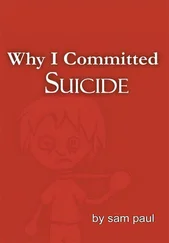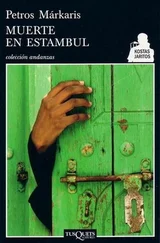‘Do you remember how long this was before his suicide?’ I asked her.
She directed her reply to Zamanis as though he had asked her. ‘It must have been around three months.’
I made a mental note to check with Sarantidis, the publisher, when it was that he received the manuscript, but the dates coincided more or less.
‘Can I please ask you to stop your investigations into Balkan Prospect?’ Zamanis said very formally as soon as Lefaki had left. ‘Firstly, because its dealings are completely legitimate and, secondly, because you’re not working for the Fraud Squad.’ He paused briefly and added meaningfully: ‘Unless, that is, you want to go to your superiors for approval.’
Although I’ve been years on the Force, I still can’t understand why it is that every loudmouth who thinks he has some clout considers it proper to end the conversation by bringing up the threat of my superiors.
‘Let me tell you what will happen if you were to talk to my superiors,’ I said. ‘They will have to talk to me, but they won’t be the only ones to hear what I have to say. From then on, it’ll only be a matter of time before it reaches the ears of the reporters, who even know when we in Security go to pee.’
Before he had had time to swallow what I’d said to him, I had said goodbye and was outside the neoclassical building. The centre of Pangrati was chock-a-block with traffic and it took me the best part of half an hour crawling bumper to bumper and making liberal use of the horn to get away. Fortunately, the temperature had fallen and I didn’t end up drenched in sweat.
At home I was met by an unexpected sight. Sitting before the computer was Koula’s cousin, who had come with her on the day she and I had begun working together. Koula was sitting beside him. They heard me come in and turned round. The young lad limited himself to a plain ‘hello’. Koula, however, jumped up and, full of enthusiasm, said:
‘I don’t know where to begin! We found a way into the records of the Ministry of Trade and got the information we wanted about Stathatos’s company! Do you know who’s a partner with a forty per cent share in the company?’
‘Favieros!’
‘No. His wife, Sotiria Markakis-Favieros.’ I remained silent for a moment to let it sink in, while Koula went on with the same enthusiasm: ‘I went to the Ministry just as you told me, but I had to deal with some dolt who didn’t listen to a word I was saying. When I told him I was a police officer, he gave me an arrogant look and told me to send my superior and preferably with a warrant from the public prosecutor. That was when I thought of Spyros, my cousin.’
Sotiropoulos hadn’t realised that his guests were talking about Favieros’s wife and not Favieros himself.
‘And there’s something else, but I’m afraid that you won’t like it,’ Koula continued, handing me a magazine from the coffee table. ‘Spyros brought it and I came across this while I was thumbing through it.’
It was a full-page advert:
LOUKAS STEFANAKOS
THE MAN – THE ACTIVIST – THE POLITICIAN
By the biographer of Jason Favieros
MINAS LOGARAS
There was a photo of the cover and underneath, the name of the publishers: Europublishers. It was the simplest solution. Logaras had sent the second biography to a different publishing company.
This new development automatically put an end to my theory about Favieros’s autobiography that just an hour previously I had served up to Yannelis and Zamanis as my specialité . I imagined their smiles when they saw the advert, but this was the least of my worries.
The second biography had appeared in a much shorter time than the first. The first had taken ten days, the second barely a week. That meant that someone had gathered information about the two suicides, then sat down to write the biographies and sent them to the publishers before Favieros and Stefanakos had committed suicide. So there was a mastermind behind all this; someone who had planned the suicides and who had the power to make them happen. Except that I didn’t know who, how or why. Just as I didn’t know whether there would be another victim. In other words, I knew nothing.
‘Biography n.: 1. account to a greater or lesser degree detailed of the life and works of a person: Mus. Rot . Bibl. 335, 114 such forms of biography 2. art of the biographer.’
‘Biographer n.: writer of a biography or biographies: Beethoven’s biographer 2. pl. biographers: the writers, acc. to the ancient Greeks, of short biographies of orators, philosophers, poets, historians, scribes et al.’
Logaras certainly couldn’t be classed among the biographers in the plural. Firstly because Favieros and Stefanakos didn’t belong to the category of orators, philosophers, poets et al., as stipulated by Dimitrakos. And secondly, because his biographies were by no means short. In fact, the second was much longer than the first, being 350 pages in length. Apart from that, the publication itself was more handsome that the previous one. It had a matt paper cover, with dark blue lettering on a grey background, and in the centre was a recent photograph of Loukas Stefanakos making a speech. It had obviously been lifted from some newspaper or magazine.
This time I went about things differently. I made sure I got hold of the biography in good time so that I would be able to read it comfortably in the afternoon and not have to spend another night in the armchair burning the midnight oil. The visit to the publishers could wait. I was sure that Logaras – whoever he was – had gone down the same road with the second publisher as with the first, one that would no doubt lead me once again to the uninhabited house in Nisaias Street.
We had to start looking urgently for a third biography. I could have kicked myself for not doing it straightaway after Favieros’s suicide. I’d been blinded by my certainty that Logaras was Favieros and that the biography was an autobiography. Now that I’d come unstuck, I would have to get my finger out to prevent the worst. I told Koula to get me a list of Greek publishers. After about half an hour, she managed to get hold of one from the Book Publishers Association. She phoned them all, one by one, but didn’t come up with a third biography. That was good news, in part, because it meant that there wasn’t any third suicide candidate, at least for the time being. Of course, one might be sent to any publisher at any time, so we had asked all of them to inform us immediately if they received anything written by a Minas Logaras. Not that I expected this would lead us anywhere. Whoever was hiding behind the pseudonym Minas Logaras didn’t have his eyes shut. He would no doubt have foreseen that we would take measures after the second biography and would be in no hurry to send a third.
It was already turned five o’clock when I sat down in my armchair and opened the book, but I was immediately interrupted by Adriani.
‘Do you intend to read Stefanakos’s biography?’
‘Yes, and as you can see I’m starting early so you won’t be griping at me again about my staying up all night.’
‘Why don’t you read it in the park?’ she asked with a sugary smile. The sugar then melted into nostalgia. ‘We haven’t been for such a long time and it’s an opportunity today as it’s not so hot.’
Her idea wasn’t at all a bad one. On the one hand, I’d be doing what she wanted and, on the other, if I sat for eight hours in the armchair, I’d stiffen up. The walk there and back and the change of air would do me good.
I don’t know if anything else had changed in the park, but the cat was no longer in its regular spot. Nevertheless, I kept to our informal arrangement and sat on my usual bench. The park was deserted as always; the sun was piercing through the leafage; everything was just as we had left it, apart from the temperature, which was higher and with an increase in the humidity.
Читать дальше












